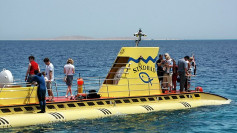There are a lot of planned missions to Mars in the coming years. But, being on another planet doesn't mean that astronauts are safe with diseases as germs and bacteria on space are more dangerous than on earth.
According to National Geographic, a sick astronaut can put an entire space mission at risk. When the mission is on Mars, they are about 33 million miles away from earth. So, space travelers don't have the ability to treat a disease when it arises as they only have limited medicine supply.
The spacemen may opt to use Mars' resources, but they may be more susceptible to the Martian germs and bacteria lurking around. There are even studies that prove some microorganisms behave badly in space.
"We better figure out what the microbes are doing in response to the spaceflight environment before you just send humans up there for long-term flight," Cheryl Nickerson from Arizona State University said. The lower gravity can make the human immune system weak. Microgravity can also change how microbes respond to stresses. It can boost the disease to be much worse and more resistant to treatments.
There are also studies, conducted both in space and on Earth, revealed that spaceflight could affect how some bacteria respond to its environment. There are also some researches that showed it could change the "microbial growth, size, metabolism, and antimicrobial resistance," among others.
In the coming years, there are a lot of missions to Mars conducted by both private and government-owned space agencies. The National Aeronautics and Space Administration (NASA) is set to launch its much-awaited Mars 2020 rover mission in July or August 2020, per The Sun. It aims to investigate the planet's past habitability and discover if life ever existed there.
The European Space Agency (ESA) will also launch its ExoMars mission in 2020. It wants to deliver a European rover to the red planet's surface and also search if there are any signs of life.
China National Space Administration also plans for a rover mission on Mars that will launch around July or August 2020. It also wants to see if there is life on the planet, either current or past. It also aspires to examine its "landscape, soil composition," and if there is ice water on it.
The United Arab Emirates Space Agency also hopes to launch its first ever "interplanetary mission" to Mars in July 2020. Its spacecraft is said to coincide with the country's 50th founding anniversary. It aims to travel the space for about 200 days.
Elon Musk's SpaceX reportedly has planned some missions to Mars. Its first mission will launch in 2022. There are a lot of goals it wants to aim from confirming water resources, identifying hazard to building "initial power, mining, and life support infrastructure" on the planet.
SpaceX also aims to deliver cargo and human crew to Mars in 2024 to build a propellant depot and prepare for other future flights. The missions intend to begin the making of first base on the mysterious celestial body. Its main goal is to build a city that can sustain civilization.
Lastly, NASA has a mission called Deep Space Transport 2029 on Mars. It will run from 2018 to 2025, and it aims to build, test, and launch rockets. The rockets will hold and deliver Deep Space Gateway's, a new space station, parts that it plans to build near the moon.






